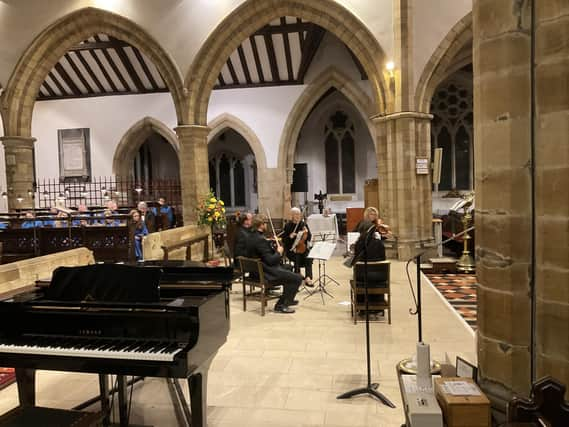Horsham celebration of 150th anniversary of Ralph Vaughan-Williams’ birth


Continuing the Horsham Music Circle’s 81st Session was an eclectic and profoundly British collection of pieces celebrating predominantly the 150th anniversary of the British-born composer Ralph Vaughan-Williams’ birth, but also, consequently, the joys and miracles of community and local musicianship. The collection-in-particular consisted of pieces by the hand of Vaughan-Williams, two of his pupils, and a close friend also: Ivor Gurney, Gordon Jacob, and Gustav Holst. All the musicians performing in this concert were from or around Horsham with deep connections to the area, giving a renewed and definitive meaning to the Horsham Music Circle.
Opening the concert was the St Mary’s Choir, singing ‘All People That on Earth do Dwell (The Old 100th)’ for which the audience were to join in three of the verses. The complete willingness and enthusiasm of the audience married wonderfully with the choir and organ, creating a sound both brilliant and heart-felt in nature – a rather appropriate feeling for this concert, seeing as Vaugh-Williams himself was an avid enthusiast for community music. A few words were subsequently said, giving us a spell of tasteful information and informing us, the audience, of what is to follow.
Advertisement
Hide AdAdvertisement
Hide AdThe ever popular ‘The Lark Ascending’ was performed by Zoe Eborn, violin and Jeremy Weaver, piano. The performance itself was approached and played by Zoe with diligence who, when paired with Jeremy’s pleasant and soft touch at the piano, created a very convincing air of serenity. This was followed by a set of four songs: ‘Bright is the Ring of Words,’ ‘Orpheus with His Lute,’ ‘In Flanders,’ and ‘Bread & Cherries’ performed by the Hon. Organising Secretary herself, Jill Elsworthy, soprano and Edward Dean, piano. It was a lovely and thought-out coupling of short, sweet songs which allowed for a wide contrast in mood and feel – the outermost songs had a bright and cheerful quality to them, with the inner two pieces receiving a darker yet still very warm tone.
Moving to a fully instrumental setting, the Sussex Chamber Players, consisting of Anna Giddey and Adam Barker on violins, Emily Marsden and Anna Cooper on violas, and Joe Giddey on Cello, performed Vaughan-Williams’ ‘Phantasy for String Quintet’. From start to finish there was a wonderful synchronicity and homogeny allowing for a sound rich and deep to arise from the ensemble. The piece was characterised by the group in such way, highlighting stark juxtapositions between the delicate, soft, French-impressionist lines that RVW picked up during his time studying under Ravel, and the more boisterous, British-folk undertones that Vaughan-Williams is so intrinsically connected to. A second performance from the St Mary’s Choir followed – ‘O Taste & See’ and ‘Let all the World in Every Corner Sing’. A powerful and climatic ending to the first half of the concert in which the whole church was filled with triumph.
Ralph Vaughan-Williams’ ‘Nocturne & Scherzo’ (1906) was picked up by the Sussex Chamber Players after the interval. A completely different yet authentic sound, overflowing with dramatic and soaring lines underscored by highly chromatic passages, creating an undying sense of restlessness and undulation throughout the piece’s entirety.
Another set of songs followed: ‘The Infinite Shining Heavens,’ ‘The Vagabond,’ and ‘Down by the Salley Gardens,’ this time sung by Ian Gardner, baritone, accompanied by Jeremy Weaver, piano. Each piece was articulated well with clear diction allowing for good phrasing and a compelling conveying of the text’s meaning. A sincere feeling of comfort blanketed the set of songs, instilling pastoral memories of the countryside and folk traditions not native to my own. These folk inflictions and nuances were further continued by Joe Giddy, cello, who played a selection of four pieces from Vaughan-Williams’ ‘Six Studies in English Folk Songs’ (No.1, 3, 5, & 6) accompanied again by Jeremy Weaver. They were each played with poise and lyricism, establishing a sense of speciousness and reflection, perfectly capturing the poetic qualities and characters of the folk songs themselves.
Advertisement
Hide AdAdvertisement
Hide AdThe organist of the concert, Edward Dean, got his own time in the spotlight, playing two out of the three preludes from RVW’s ‘Preludes on Welsh Hymn Tunes’ – ‘Rhosymedre’ and ‘Hyfrydol.’ Edward utilised the organ very well, not only conveying, to us, imaginings of green rolling hills in the Welsh countryside, but also the grand vastness of them too. Once the two pieces came to close the choir proceeded to stand for their final performance of the concert – ‘Turn Back O Man (The Old 124th)’ and ‘For All the Saints,’ the latter of which the audience joined to sing with the choir again.
A wonderful feeling of high-spirits and intimacy filled the room as the concert came to a close. The final piece to be played was by Edward Dean on the organ – ‘Fanfare’ by Gordon Jacob. A brilliantly triumphant and highly fitting ending for this celebratory concert.
Reviewed by Luca J Imperiale